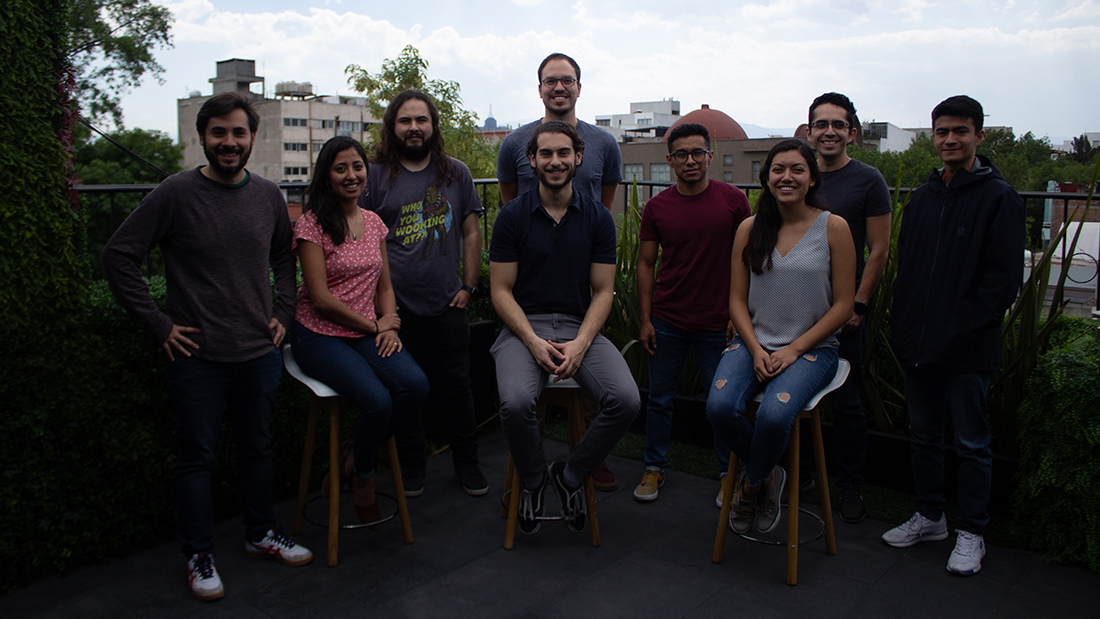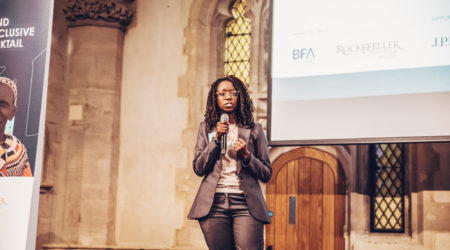A creative approach to startup financing: Graviti combines grant, debt and equity investment, linked to impact outcomes

It took Catalyst Fund portfolio company Graviti only two months to raise a debt round that will finance 600+ solar water-heaters for underserved Mexican families, via their innovative pay-as-you-go (PAYGo) platform.
Although raising debt may seem like an odd choice for most early-stage startups, Graviti’s unique fundraising journey has positioned them well for future growth and fundraising. Graviti has been careful and creative in tailoring a funding continuum that includes grant, debt, and equity investment so as to fuel different aspects of its growth, all while finding ways to deliver on the different financial and impact objectives of investors.
Catalytic capital to validate early proof points
Graviti is a PAYGo company providing affordable access to sustainable services, such as solar water heaters, to underserved populations in Mexico. When Graviti joined Catalyst Fund early in 2020, they had already raised $330,000 in pre-seed capital but had ~6 months of runway left. Like all Catalyst Fund portfolio companies, upon joining they received £80,000 in grant capital, as well as six months of venture-building support. The catalytic capital from Catalyst Fund helped extend Graviti’s runway, allowing them to grow their team, build a deeper track record of repayment with solar water heaters, and invest in marketing.
In addition, our venture-building support included sprints to conduct in-depth user research, test new customer segments and messages, and implement experiments to automate aspects of the onboarding journey. These additional insights and proof points were critical steps that enabled Graviti to move toward product-market fit and attract follow-on investment capital.
Over the past five years, we have seen that early-stage startups use the grant capital provided by our program to test new products, deepen their market penetration, and prove their ability to reach customers efficiently. These are the kinds of activities that traditional investors seeking commercial risk-return profiles cannot fund, but ones they need to see before investing. As such, catalytic capital can provide the bridge these startups need to attract further investment.
When Graviti joined our program, they had installed almost 100 solar water heaters, largely through partnerships with financial institutions. This approach, in which companies source the loan but it is held by a bank, is common among PAYGo companies, like Brightlife in Uganda. It allows startups to offer the financing needed to provide the service, while offloading the risk from their own balance sheets. This financing strategy was working well for Graviti until the COVID-19 pandemic brought these bank partnerships to a halt.
“We are looking to finance high-quality, sustainable appliances that cover basic needs for the unbanked, low-income population in LATAM. Our main goal is to be able to do so through accessible and fair financing. This represents a major challenge, since our target market has not had access to credit before. In order to reduce risk and avoid high interest rates, we’ve developed technology that enables us to offer accessible financing to this market.
On one side, our IoT meters, which are installed alongside every product, enable us to remotely control the functionality of the product and activate it when our users are up to date with their payments. This dramatically reduces late payments and defaults. On the other side, that same technology enables us to gather super valuable data on how our customers use their products. Through these data we can distill consumption patterns and correlate them with payment history to predict how future customers will behave and pay, based on the behavior of past, similar customers. We are building a new way of analysing credit worthiness that will unlock access to financing and basic services through sustainable infrastructure to millions of people.”
– Yusef Jacobs, Founder and CEO of Graviti
Structured, off-balance-sheet debt facility to grow the portfolio
With proof points in hand but facing a financing challenge, Graviti began to strategize the next step in their fundraising journey. Most would have assumed that an equity investment would be Graviti’s next step since equity’s longer time horizons give companies the chance to test and iterate their value proposition. Unlike debt, equity doesn’t have a short or rigid repayment schedule, so it is more appropriate for startups still on the journey to product-market fit.
However, CEO/founder Yusef Jacobs knew that he would need to grow Graviti’s portfolio rapidly to meet upticks in demand often required by equity investors – and that raising this funding would be slow. Moreover, he figured he would find himself in a better position to raise equity further down the road when the startup had a stronger lending portfolio to show.
Instead, Yusuf looked to debt funding, which could be used to fund discrete expenses like portfolio growth, allowing Graviti to reserve equity funding for strategic growth initiatives. Debt would allow Graviti to isolate lenders’ exposure to only the loan portfolio, while protecting them from execution risk thereby matching the risk-return objectives of debt investors. This approach would also allow Graviti to dedicate equity funding to new products and features, and other areas of growth. Together, raising both kinds of investment allows broader participation in a startup’s success, letting them package and ringfence different investment pathways.
Yet, a debt investment could also prove risky and burdensome for Graviti, an early-stage company with uncertain future earnings that might fail to generate the cash needed to repay the fixed-cost of debt.
Looking for a middle ground, Graviti opted for an alternative financing instrument: a structured debt facility that would sit outside of their balance sheet. Such a special purpose entity would allow Graviti to more quickly raise capital for lending, without exposing investors to operational and executional risk. Additionally, Graviti knew that the incredibly low default rate—less than 1% of the total loans generated—achieved through their PAYGo model and proprietary credit scoring tool, would make it an attractive bet for debt investors.
It didn’t take long for Graviti to get noticed by Addem Capital, an investing firm specialized in creating and financing structured debt facilities for fintech loan originators in Latin America. Addem specializes in securing the quality of a company’s origination and collection policies, reporting standards, and the mechanics of the debt facilities in order to unlock further capital. Additionally, Addem Capital conducts rigorous credit risk analysis and takes a subordinated position in most of their investments to demonstrate confidence in the model. This approach allows Addem Capital to take very early data points and provide hands-on support in developing institutional-grade credit traceability, from origination to collection, to further de-risk the investment opportunity for potential senior debt investors.
“We are trying to show the world that complex debt structures are not exclusive to Wall Street nor multi-million dollar deals. LATAM not only has great founders and great ideas, but also an opportunity to generate high-yielding opportunities for foreign investors driven by the lack of access to financial services in the region rather than actual default risk.
We are confident that with the right process we can contribute to closing the financial gap in the region by creating straightforward debt structures that allow new players to grow, and more importantly, compete at the highest levels.
By giving promising startups and scale-ups in the lending space the means to fulfill their potential, we are sure we can make a difference in the region and ultimately accomplish our goal of closing the financial inclusion gap that has hindered LATAM’s development for decades.”
– Pedro Cetina Bernal, Addem Capital
Addem’s unique approach and skills allow them to provide Graviti exactly the type of support they needed to scale their lending operations. In July 2020, they structured an initial $250,000 off-balance sheet debt facility to accelerate lending activities without diluting the investor base or further complicating governance. Together, Graviti and Addem invested $80,000 and took on subordinated positions in the structure to make it more attractive to senior-debt investors. Additional debt investors would sit at safer tranches of the debt facility given that they would have first claim to the collection rights of financed solar water heaters while Graviti and Addem would face first losses.
Senior debt to link growth performance and impact outcomes
Two months into the fundraising effort, the team found and recruited Viwala, an early-stage impact investor in Mexico, for the senior debt tranche, through Catalyst Fund’s Circle of Investors.
Viwala offers loans with revenue-based repayment structures as a founder-friendly alternative to raising capital. With this type of debt structure, the incentives of both the founders and the investors are well aligned. On the upside, if the enterprise’s financial performance improves, then the repayment period is shortened. However, if the startup experiences a period of low revenue, the loan payment is adjusted to avoid additional pressure on the company.
As an impact investor, Viwala was sold on Graviti’s model, given the startup’s potential to reduce a family’s monthly costs in the long term by allowing them to own a solar water heater. The pay-as-you-go model also means that the family doesn’t incur a large upfront payment, thus minimizing the strain on the sometimes-fluctuating income of the household and contributing to improved financial resilience.
With Viwala as a senior debt investor, Graviti’s debt round was oversubscribed by over 30% of what they were originally hoping to raise. Viwala also embedded impact incentives into their investment that, if met, could mean a 30% write-off of the debt, subsidized by the Swiss Agency for Development and Cooperation (SDC).
” The purpose of any incentivization scheme is not to provide a direct subsidization of the product or service offered by the enterprise. Rather, it is to catalyze or accelerate emerging ideas or models that are tackling basic needs of underserved populations and that, without incentivization, might not receive the time and attention they need to grow and become an integral part of the business model.
Graviti is at just such a juncture: they have an unmatched potential to develop in ways that prioritize highly-impactful products and services or to think of ways to offer these services to populations that might not, at first blush, be seen as a viable customer base for Graviti.
However, they are also faced with a pressing commercial imperative to add new product lines and expand their customer base. This commercial imperative may take precedence and de-prioritize or even discourage thinking about these more impactful angles.
Therefore, we have chosen to tie our investment to impact outcomes in order to counter such commercial imperative and directly incentivize a continued and increased focus on the innovation of business models that place the needs and desires of Graviti’s customers, current and potential, at the forefront.
– Karla Gallardo, Viwala
Looking ahead – raising debt and a Pre-Series A equity round
Catalytic and impact-incentivized capital from Addem, Viwala, and Catalyst Fund will eventually allow new investors to participate and magnify the impact that Graviti is creating, without facing the risk of going it alone during the early days. Graviti’s journey is a good example of the greater flexibility and creativity startups need in the form of more diverse instruments along different points in their journey.
Today, Graviti is pursuing a $1.2M extension of their debt facility (33% of which has already been subscribed) alongside a $1.5M Pre-Series A equity round. With the robustness of the first stage of the debt facility in place and boasting a 54% month-on-month growth on average, Graviti is free to dedicate the totality of the debt investment to focus on growing the business by reaching more customers and use the equity to build additional distribution networks for more products and appliances that can improve people’s lives.
Catalyst Fund is helping Graviti define a strategic and responsible growth vision that will help the startup to expand its product and service offerings, customer base, and target markets. At the time of this article, the startup is executing a pilot program for new, sustainable, savings-generating products such as rainwater harvesting systems, and is refining their proprietary alternative credit scoring tool to reach more underserved segments of the population. The team is also developing a framework to identify additional products and appliances that can promote a family’s financial health. These steps will allow Graviti to meet their financial objectives without jeopardizing the startup’s social and environmental goals and, more importantly, without over-indebting their customers.
With super-charged capabilities and a diversified set of investors behind them, we have no doubt that Graviti will be attractive to both equity and debt investors, and we invite many to join their mission of providing families in LATAM with access to sustainable basic services.

